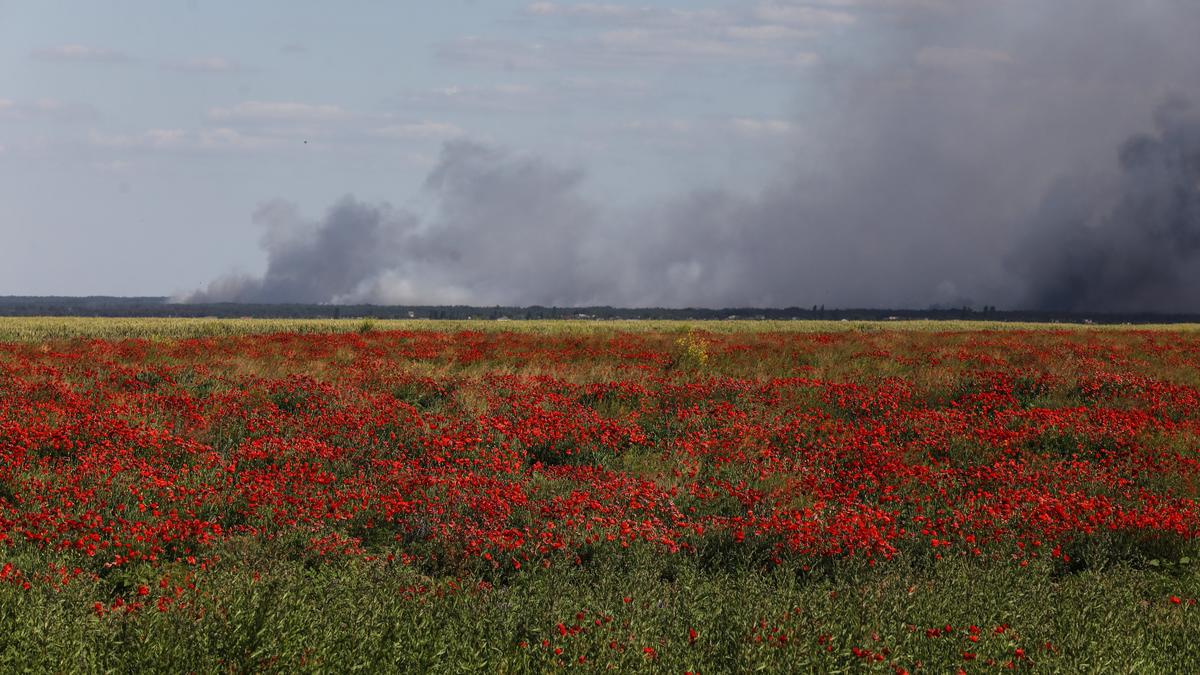God, what have they done to my homeland? Why did you let this happen? I no longer have a house. They’re ruining the fertile soil. They flooded my home. The water is thick with mud, the wreckage of our once prosperous lives and the tears for our drowned mothers, fathers and children…
WINTER
Give me the strength not to scream
A year ago, a friend sent me a message. “If you’re still in Kherson, get out as quickly as you can. I heard from a friend in the military in Moscow that after the retreat, they have decided to ‘flatten’ Kherson and won’t leave a building standing.” Ever since, my sunny southern city has lost a little more every day: building by building, person by person. Thirteen months of pain and loss.
Lydya, a pensioner, has been sitting in her apartment in the Korabel district of Kherson for six months. She can’t go out due to the effects of a stroke, and only saw the liberation of Kherson through her window. She spends all her free time — she now has a lot — praying: for her beloved city, for Ukrainian soldiers, for her children and for her fellow townspeople. She screams involuntarily whenever there is an explosion close by.
The war has come to the nearby town of Hola Prystan too. “Russian soldiers get drunk and drive around the city in tanks,” says Natasha, a childhood friend. “They shoot at our houses, have what fun they can.”
We asked them why they were killing us, and their response was evil: ‘All the normal people have headed for Crimea. Only people waiting for the Ukrainian army are still here. We didn’t get orders to spare you.’”
Natasha buried her mother in January. The only company Valya, her mother, had on her final journey, was her daughter and daughter-in-law. Nobody else could make it. The new government gets nervous if people gather in any numbers. Natasha didn’t hold a wake at home either. They barely got the money together for the cheapest coffin. The price had quadrupled since Ukraine lost control of the area.
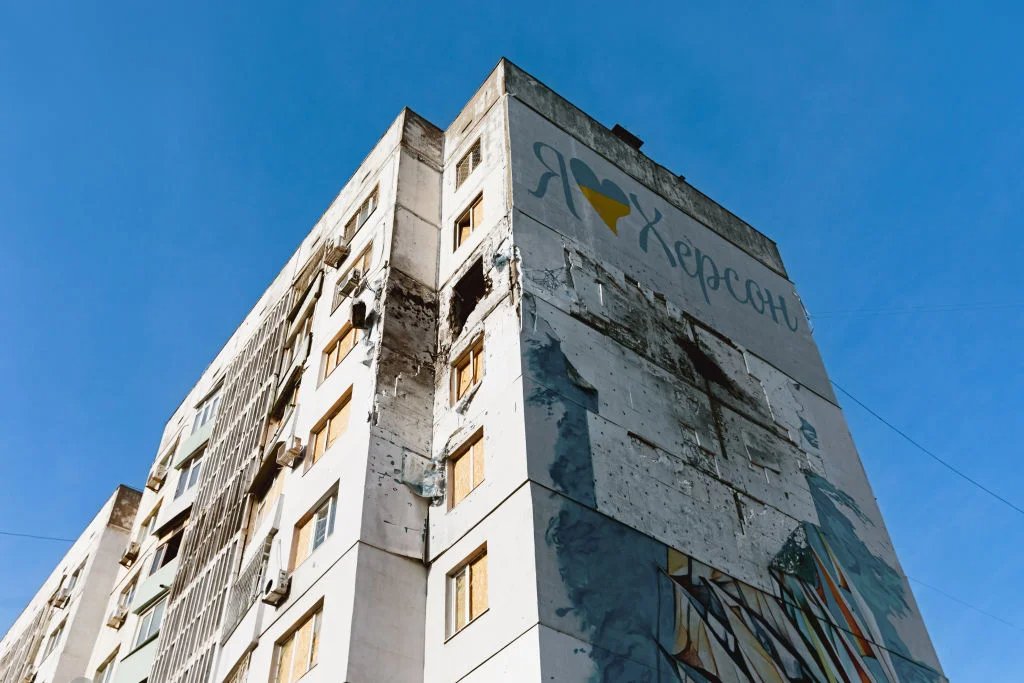
Kherson. Photo: Mykhaylo Palinchak / SOPA Images / LightRocket / Getty Images
Two gravediggers lower the heavy coffin into a hastily dug grave in the frozen ground. It makes a thud as it hits the bottom. Not far from the cemetery, there is an explosion. Natasha stays silent. “You should go. What if there’s an air strike?” The voice of the gravediggers rouses her.
When it gets dark, Natasha puts her children down for the night and makes her way to the farthest corner of the garden, lights a cigarette and takes a deep drag. She begins to sob noiselessly. She no longer has the strength to hold in the grief eating her up inside.
SPRING
They know what they’re doing
Nadezhda, a pensioner, lives in the occupied village of Kardashynka, between Hola Prystan and Kherson. She was born in Russia, but married a Ukrainian. She took to her husband’s homeland with all her heart. When the war began, she started hating Russians and her own mother tongue. She has given up her Russian passport and pension and spent the first year of the occupation surviving on her reserves, the benefit being that there were fewer problems with food in the countryside than in the city.
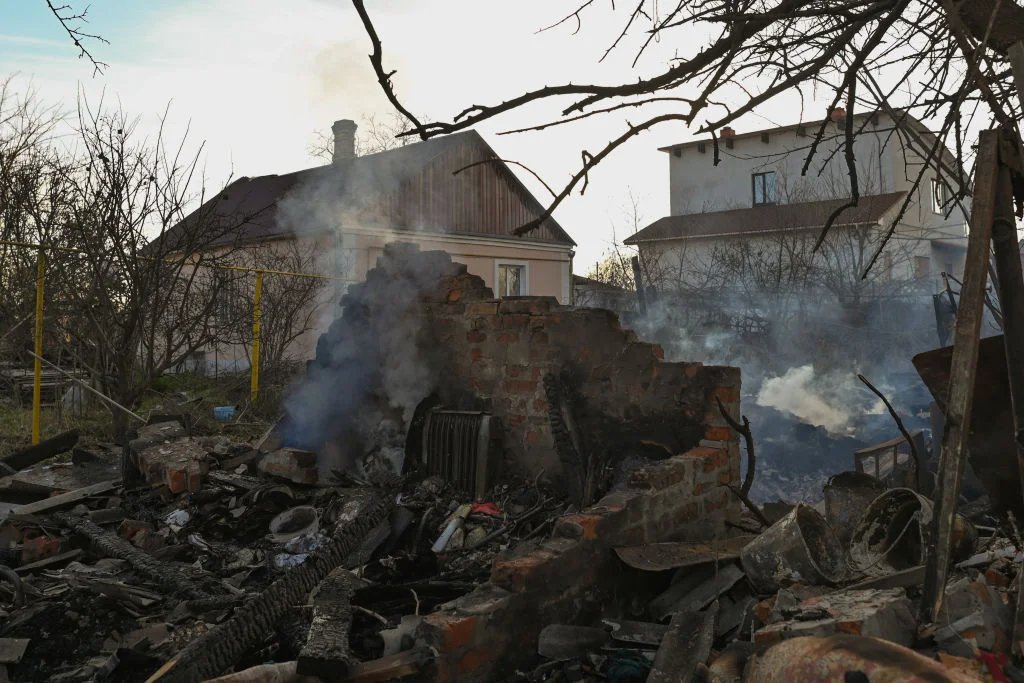
Kherson region. Photo: Artur Widak / Anadolu Agency / Getty Images
There are Russian soldiers living next door. They have a rocket launcher in the garden. They loot empty houses in the village and boast to each other about what they’ve got. They hurtle around in cars stolen from locals. When they wreck one, they help themselves to another. Early in the morning and in the evenings, the soldiers are busy firing at Kherson and when they drink, they fire at Hola Prystan too. And they drink every day.
Olha, a Hola Prystan businesswoman, closed her small business as soon as the occupiers demanded locals register with the Russian tax authorities. She didn’t want to pay taxes to the Russian treasury and finance the murder of her relatives. Olha admits that she no longer listens to music, as she is always listening for incoming fire, even in her sleep. She knows she will never fall prey to Stockholm syndrome. She will never get used to her tormentors.
SUMMER
At least leave us air to breathe
“Please help! I’m disabled. I have two old women and my wife with me. We can’t get onto the roof,” 70-year-old Viktor Kramarenko wrote on a Hola Prystan public chat. It is the last thing he ever wrote. His children have reread it hundreds of times.
6 June. The day all Kherson’s nightmares came true. We all knew from first grade that if the Kakhovka Dam was ever breached, parts of Kherson and Oleshky, Kakhovka and Nova Kakhovka, Beryslav, Hola Prystan and many other settlements would end up under water. We learned which areas would be less flooded, how quickly the water would come and how long it would stay on the street…
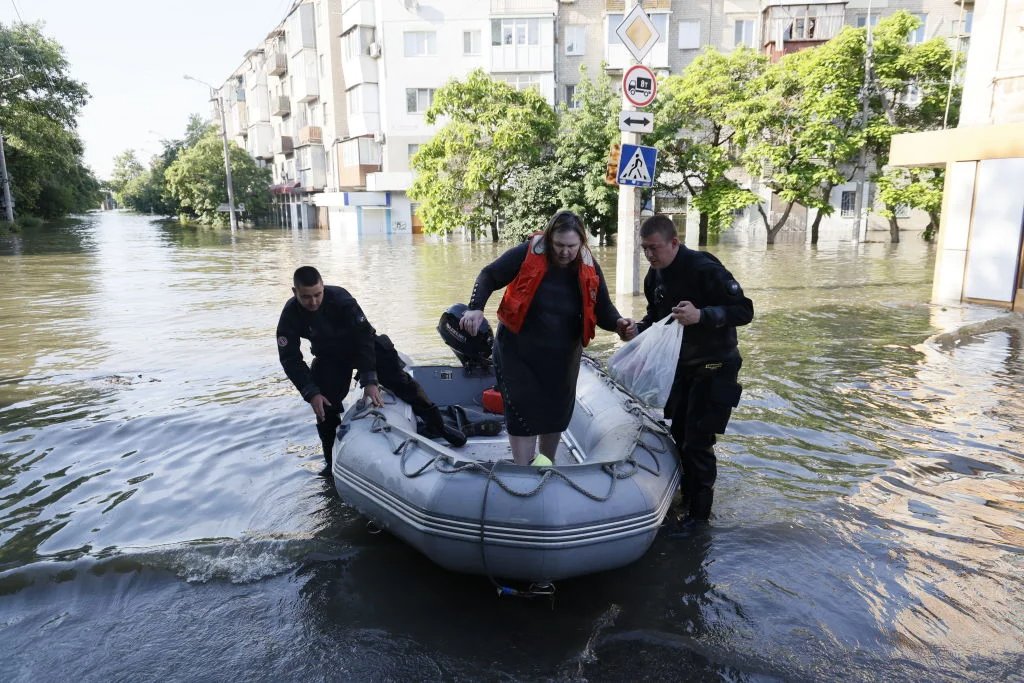
Flooded parts of Kherson after the destruction of the Kakhovka Dam. 7 June. Photo: Alex Babenko / Getty Images
The water came with such force that people were knocked over and swept away with all the debris. People expected their carpets to get sodden on the ground floor, but whole houses were under water. Nobody had expected anyone to die, yet the death toll is so high that the authorities are yet to reveal it.
Natasha sat alone in her attic until morning. The night was too dark, and her mind painted a terrible picture of what was happening.
All she could hear was the roar of water and the cracking sound of houses collapsing under the pressure of the current.
At first light, she saw that the water was halfway up her windows. Only the attic, where she had taken shelter with her blanket, had remained dry. She realised it was now or never. Clinging to the stairs with her thin fingers, she lowered herself into the cold, dirty water. At some moments she swam, at others she touched the ground with the tips of her toes and pushed off that way. Natasha struggled against the current but she held on tight and worked her way towards the house of relatives where her children were staying. Her feet eventually touched the ground. She slid her way along, grabbing onto anything sticking out of the water to move forward.
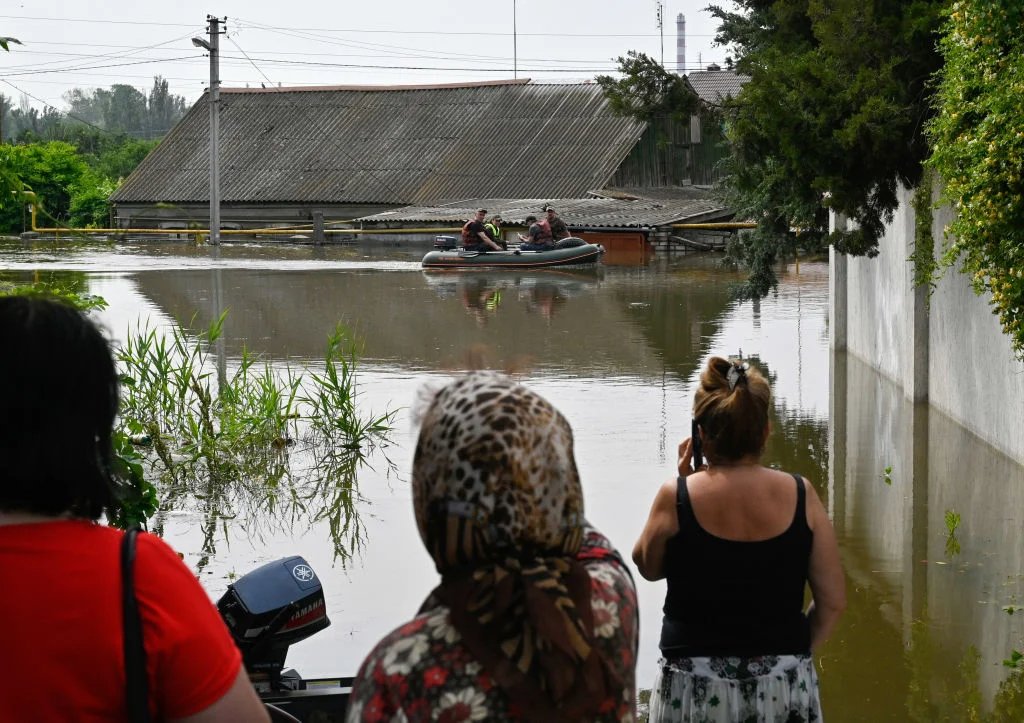
Floods after the destruction of the Kakhovka Dam. Kherson region. Photo: Sergei Chuzavkov / SOPA Images / LightRocket / Getty Images
Natasha and her children and relatives came down from the attic for good a few days later when the water began to subside. It was the first time in a week she had seen herself in a mirror. Her hair had gone grey.
Volunteers claimed repeatedly that on the first day of flooding, there were no attempts to save people in Hola Prystan, Kardashynka and Oleshky.
“The occupiers stopped us rescuing people. They threatened to shoot volunteers and blew holes in boats,” says Andriy, from Oleshky.
“A lot of people drowned, but I don’t know exactly how many. When the water subsided, the bodies were collected and handed over to relatives or neighbours. If the deceased were on their own, neighbours buried them and the relatives sent them money. Or locals chipped in.” The official line from the occupying authorities was that some 50 people had died, but in actual fact, the number of people who drowned was far higher.
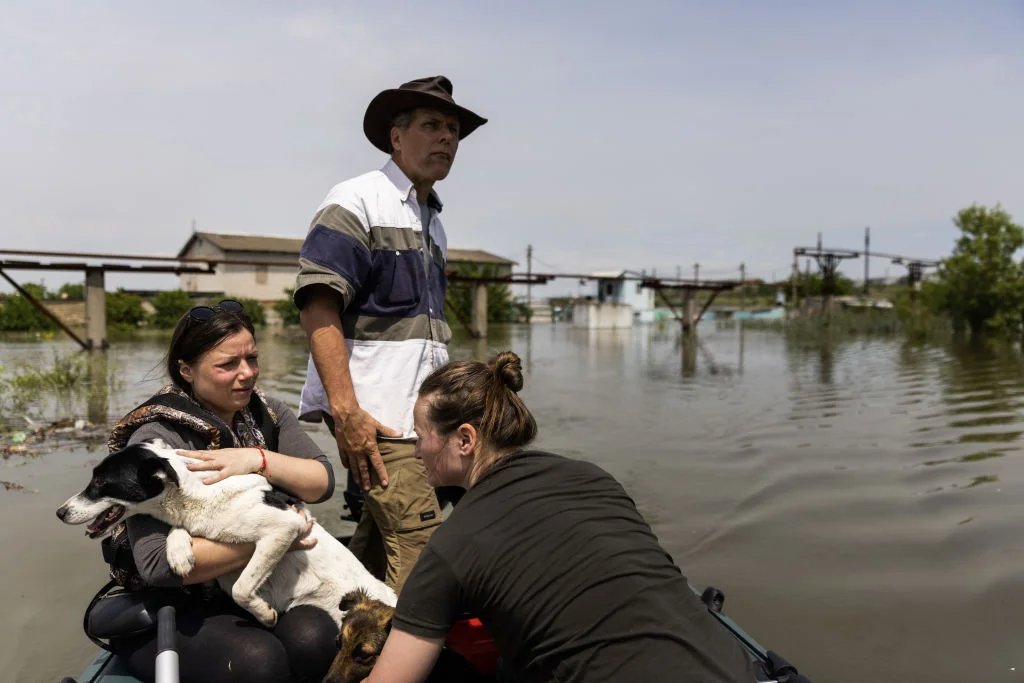
Evacuation of residents and animals from flooded areas of the Kherson region. 8 June. Photo: Daniel Carde / Anadolu Agency / Getty Images
AUTUMN
Sun, don’t hide
By the autumn, the water had fully subsided, exposing houses destroyed and vegetable plots that had been swept away. Life took its course, and people adapted to their change in circumstances. Anyone who had stayed behind spent the rest of the summer and early autumn sifting through the rubble of their homes to see if there was anything they could salvage. The streets were littered with discarded sofas, wardrobes, clothes. Everything was swollen out of shape and stank of damp and mould. Even if things were washed multiple times, it was impossible to get rid of the smell of decomposition.
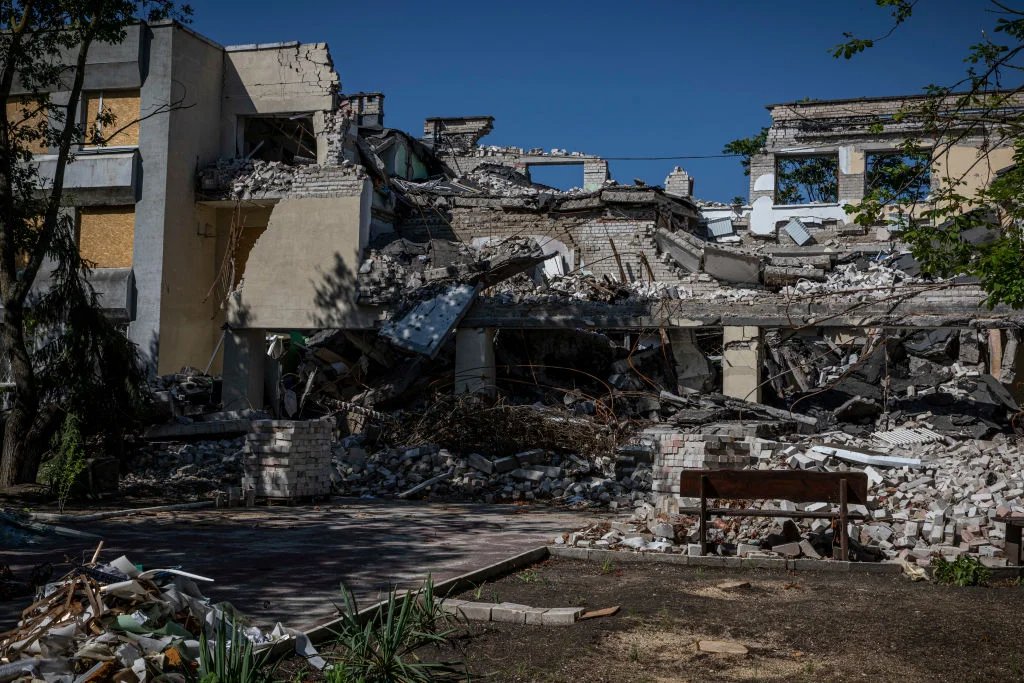
Houses destroyed by shelling in Kherson. Photo: Alex Chan / SOPA Images / LightRocket / Getty Images
Andriy lives in a high-rise building in Oleshky. Every morning he queues for grey water and then he queues again for drinking water. This is the only time of day he sees other locals.
Squabbling Russian soldiers sometimes appear in the queues too. They don’t like being here. They live like locals, without electricity, heating or running water.
One difference is that the military has generators, which improves their lives by an order of magnitude. On the downside, people try to kill them every day. When they patrol the streets in the early morning, they shoot dogs whose barking betrays their position.
OUTSIDE OF TIME
Give us back a sense of home
Nadezhda’s house is made of stone and withstood the flood. She and her neighbours have been back to Kardashynka once to look at their plots of land and collect some clothes. Their homes are now occupied by Russian soldiers who continue to destroy what the water spared in the summer.
“I looked at my house, remembered how my husband and I built it, how our children were born and grew up here, how our grandchildren took their first steps there, and I couldn’t even cry. I was completely numb inside,” says Nadezhda. “I no longer have a home. The only thing I still dream of is seeing my children. God, I want to hug my children!”
Nadezhda’s children are in an unoccupied part of Ukraine.
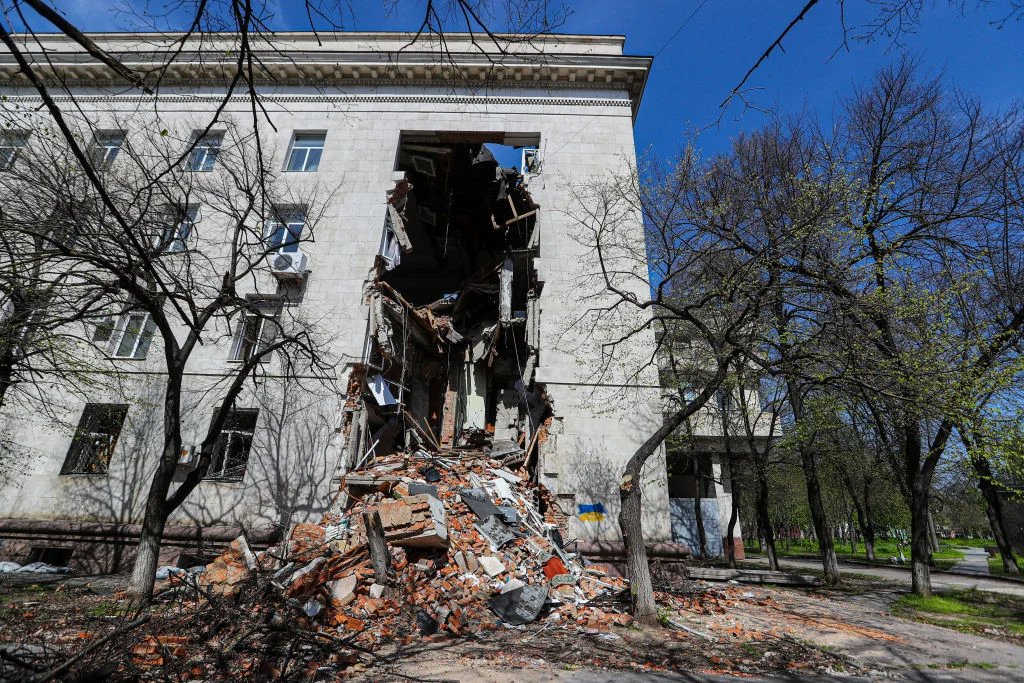
Kherson. Photo: Aziz Karimov / SOPA Images / LightRocket / Getty Images
Natasha and her children still live in Hola Prystan. She has created warmth and comfort in someone else’s home. These friends have left, unable to bear the trials by both water and military fire.
When they left, they gave Natasha the keys so she and her children had somewhere to stay.
“I don’t think about anything. Inside I am completely numb,” Natasha says.
“My children and I are homeless, but while the war is ongoing, we can live in someone else’s house. While we are in it, there is a chance that the Russians won’t loot it. Nobody can survive a rocket, of course, but we’re all in the same boat here. But what will happen when people come home? Where will we go then?”
Natasha gives her children regular school lessons every day, though they dream of going to a real school with teachers, blackboards and classmates. But even if the war ends tomorrow, they won’t be back behind their desks any time soon. The school is still a ruin after the flood. Some parts have completely collapsed. It is not yet clear if it can be salvaged.
Now they await the winter, their only hope that the weather won’t be too harsh.
“I feel nothing and don’t know how I’ll carry on," Natasha says flatly. “It’s as if we were pulled out of one reality and into another, with no home and no hope. I don’t know what the solution is, or how all this will end. That’s the worst thing.”
Join us in rebuilding Novaya Gazeta Europe
The Russian government has banned independent media. We were forced to leave our country in order to keep doing our job, telling our readers about what is going on Russia, Ukraine and Europe.
We will continue fighting against warfare and dictatorship. We believe that freedom of speech is the most efficient antidote against tyranny. Support us financially to help us fight for peace and freedom.
By clicking the Support button, you agree to the processing of your personal data.
To cancel a regular donation, please write to [email protected]
